Leaders and Operations Management
VerifiedAdded on 2023/01/06
|13
|3424
|24
AI Summary
This article discusses the key operations and approaches in operations management at Tesco, including continuous improvement, employee training and performance awards, and leadership management. It also explores the value and significance of operations management in achieving business objectives and the impact of the external business environment on management and leadership at Tesco. Additionally, it discusses how operations can be made more efficient at Tesco and the importance of operations management in achieving business objectives.
Contribute Materials
Your contribution can guide someone’s learning journey. Share your
documents today.
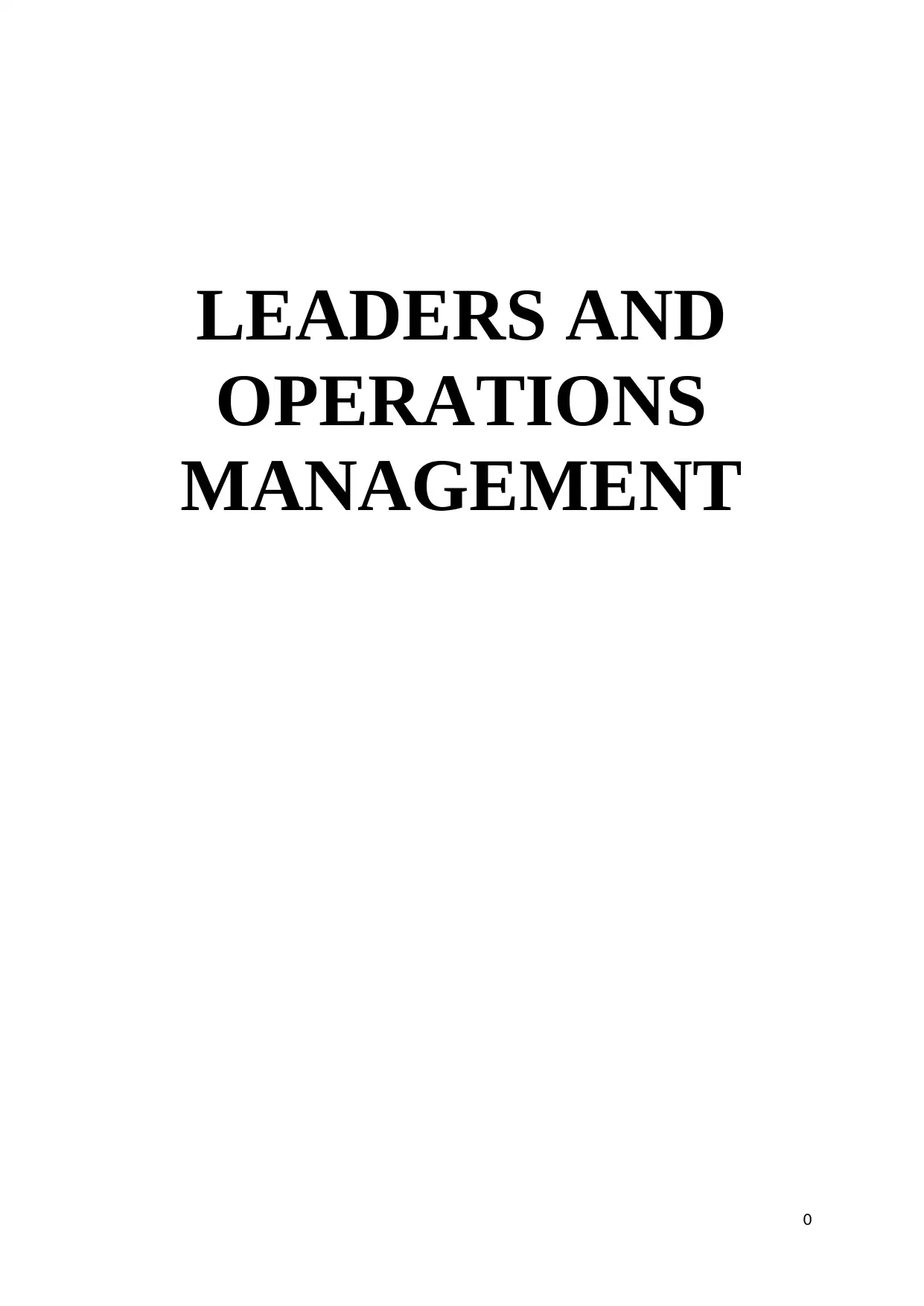
LEADERS AND
OPERATIONS
MANAGEMENT
0
OPERATIONS
MANAGEMENT
0
Secure Best Marks with AI Grader
Need help grading? Try our AI Grader for instant feedback on your assignments.
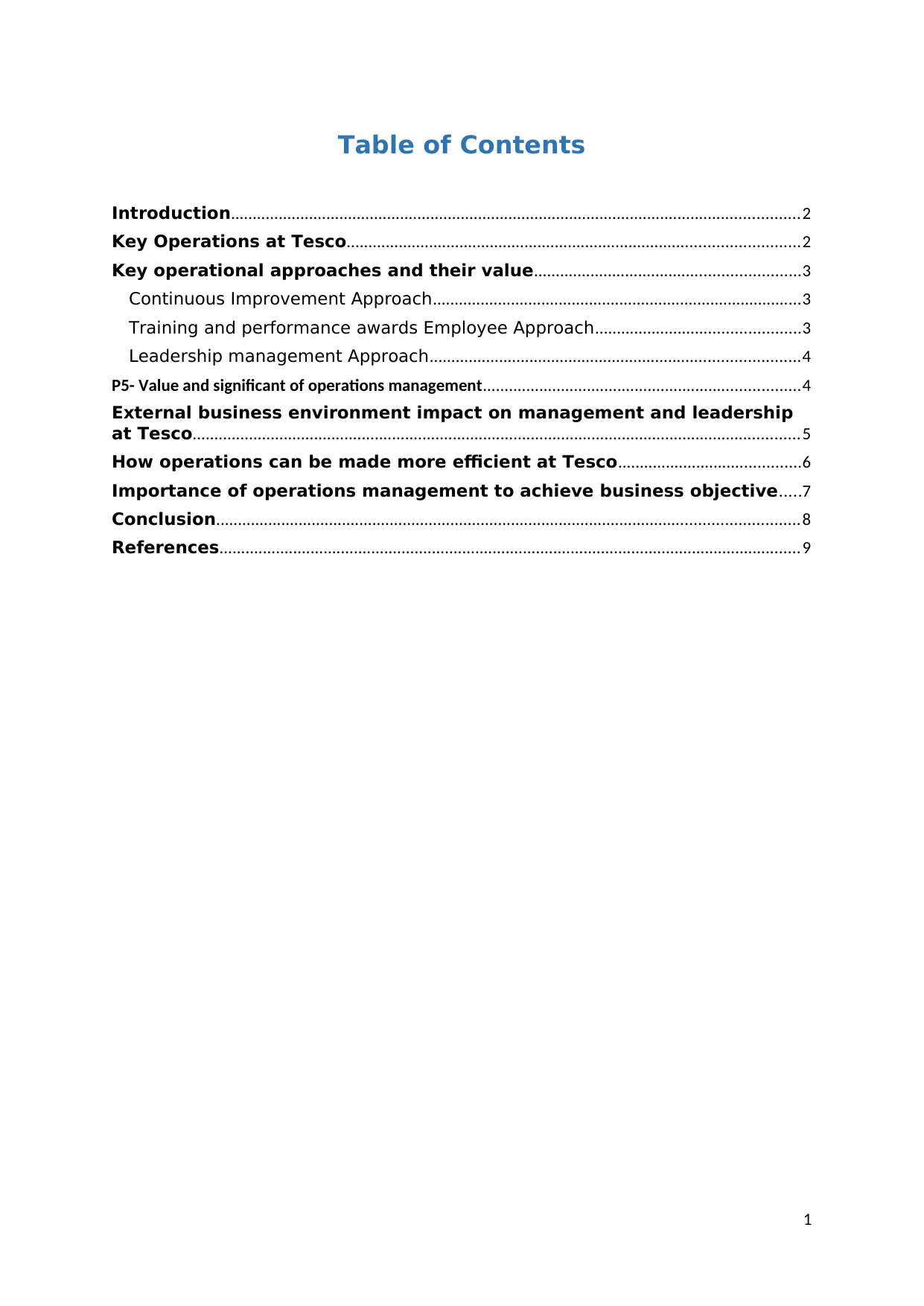
Table of Contents
Introduction...................................................................................................................................2
Key Operations at Tesco........................................................................................................2
Key operational approaches and their value.............................................................3
Continuous Improvement Approach.....................................................................................3
Training and performance awards Employee Approach...............................................3
Leadership management Approach.....................................................................................4
P5- Value and significant of operations management.........................................................................4
External business environment impact on management and leadership
at Tesco............................................................................................................................................5
How operations can be made more efficient at Tesco..........................................6
Importance of operations management to achieve business objective.....7
Conclusion......................................................................................................................................8
References......................................................................................................................................9
1
Introduction...................................................................................................................................2
Key Operations at Tesco........................................................................................................2
Key operational approaches and their value.............................................................3
Continuous Improvement Approach.....................................................................................3
Training and performance awards Employee Approach...............................................3
Leadership management Approach.....................................................................................4
P5- Value and significant of operations management.........................................................................4
External business environment impact on management and leadership
at Tesco............................................................................................................................................5
How operations can be made more efficient at Tesco..........................................6
Importance of operations management to achieve business objective.....7
Conclusion......................................................................................................................................8
References......................................................................................................................................9
1
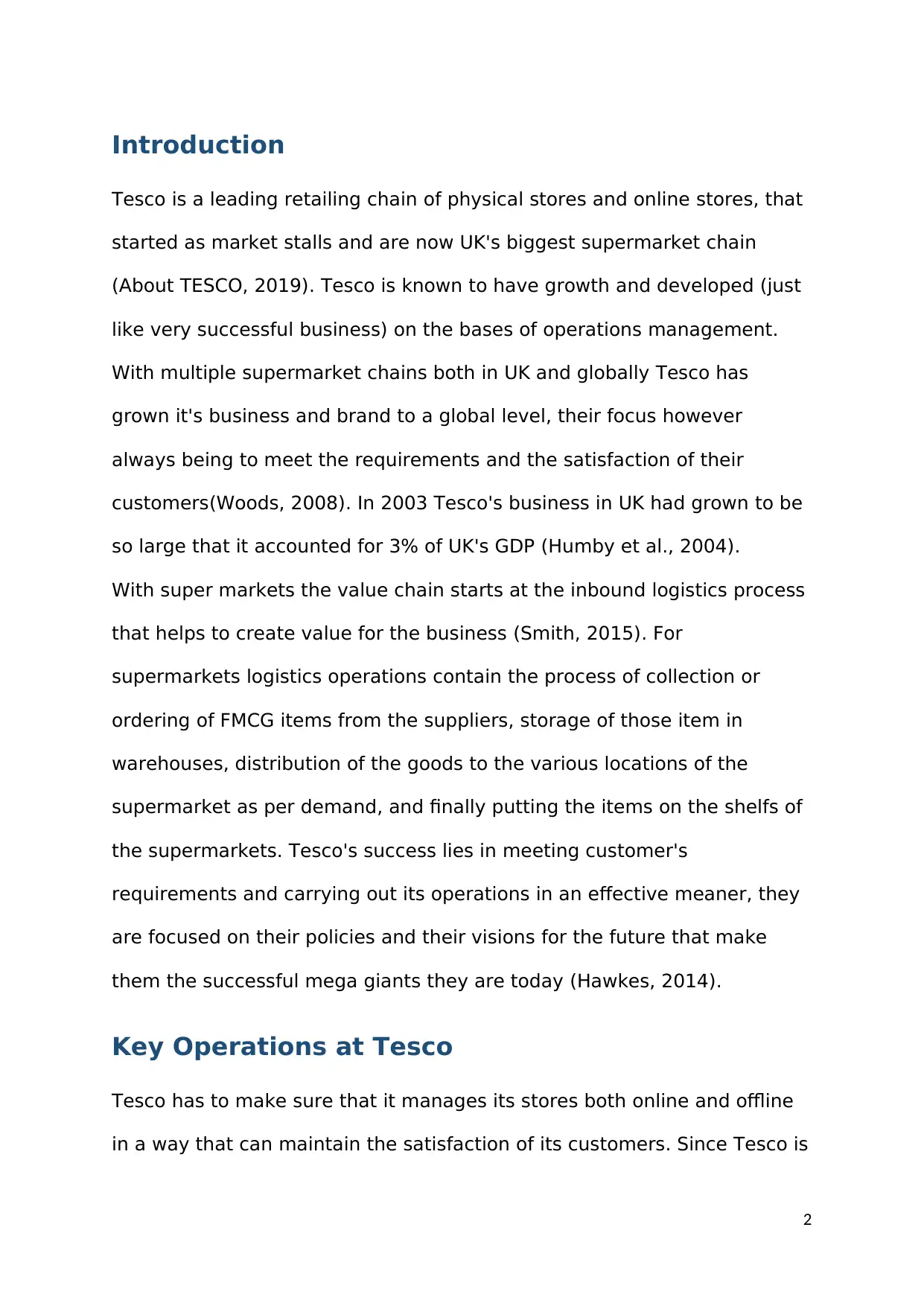
Introduction
Tesco is a leading retailing chain of physical stores and online stores, that
started as market stalls and are now UK's biggest supermarket chain
(About TESCO, 2019). Tesco is known to have growth and developed (just
like very successful business) on the bases of operations management.
With multiple supermarket chains both in UK and globally Tesco has
grown it's business and brand to a global level, their focus however
always being to meet the requirements and the satisfaction of their
customers(Woods, 2008). In 2003 Tesco's business in UK had grown to be
so large that it accounted for 3% of UK's GDP (Humby et al., 2004).
With super markets the value chain starts at the inbound logistics process
that helps to create value for the business (Smith, 2015). For
supermarkets logistics operations contain the process of collection or
ordering of FMCG items from the suppliers, storage of those item in
warehouses, distribution of the goods to the various locations of the
supermarket as per demand, and finally putting the items on the shelfs of
the supermarkets. Tesco's success lies in meeting customer's
requirements and carrying out its operations in an effective meaner, they
are focused on their policies and their visions for the future that make
them the successful mega giants they are today (Hawkes, 2014).
Key Operations at Tesco
Tesco has to make sure that it manages its stores both online and offline
in a way that can maintain the satisfaction of its customers. Since Tesco is
2
Tesco is a leading retailing chain of physical stores and online stores, that
started as market stalls and are now UK's biggest supermarket chain
(About TESCO, 2019). Tesco is known to have growth and developed (just
like very successful business) on the bases of operations management.
With multiple supermarket chains both in UK and globally Tesco has
grown it's business and brand to a global level, their focus however
always being to meet the requirements and the satisfaction of their
customers(Woods, 2008). In 2003 Tesco's business in UK had grown to be
so large that it accounted for 3% of UK's GDP (Humby et al., 2004).
With super markets the value chain starts at the inbound logistics process
that helps to create value for the business (Smith, 2015). For
supermarkets logistics operations contain the process of collection or
ordering of FMCG items from the suppliers, storage of those item in
warehouses, distribution of the goods to the various locations of the
supermarket as per demand, and finally putting the items on the shelfs of
the supermarkets. Tesco's success lies in meeting customer's
requirements and carrying out its operations in an effective meaner, they
are focused on their policies and their visions for the future that make
them the successful mega giants they are today (Hawkes, 2014).
Key Operations at Tesco
Tesco has to make sure that it manages its stores both online and offline
in a way that can maintain the satisfaction of its customers. Since Tesco is
2
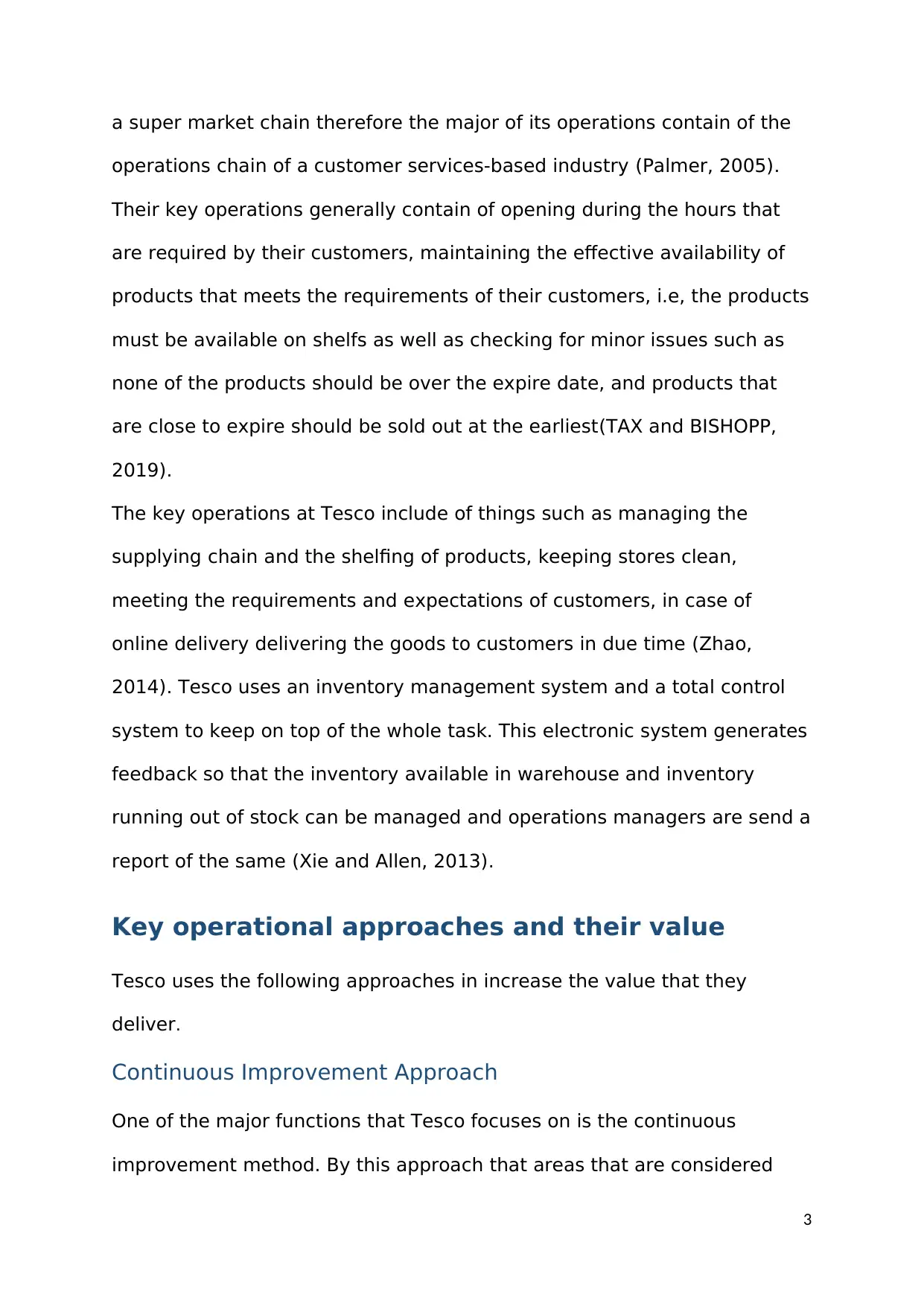
a super market chain therefore the major of its operations contain of the
operations chain of a customer services-based industry (Palmer, 2005).
Their key operations generally contain of opening during the hours that
are required by their customers, maintaining the effective availability of
products that meets the requirements of their customers, i.e, the products
must be available on shelfs as well as checking for minor issues such as
none of the products should be over the expire date, and products that
are close to expire should be sold out at the earliest(TAX and BISHOPP,
2019).
The key operations at Tesco include of things such as managing the
supplying chain and the shelfing of products, keeping stores clean,
meeting the requirements and expectations of customers, in case of
online delivery delivering the goods to customers in due time (Zhao,
2014). Tesco uses an inventory management system and a total control
system to keep on top of the whole task. This electronic system generates
feedback so that the inventory available in warehouse and inventory
running out of stock can be managed and operations managers are send a
report of the same (Xie and Allen, 2013).
Key operational approaches and their value
Tesco uses the following approaches in increase the value that they
deliver.
Continuous Improvement Approach
One of the major functions that Tesco focuses on is the continuous
improvement method. By this approach that areas that are considered
3
operations chain of a customer services-based industry (Palmer, 2005).
Their key operations generally contain of opening during the hours that
are required by their customers, maintaining the effective availability of
products that meets the requirements of their customers, i.e, the products
must be available on shelfs as well as checking for minor issues such as
none of the products should be over the expire date, and products that
are close to expire should be sold out at the earliest(TAX and BISHOPP,
2019).
The key operations at Tesco include of things such as managing the
supplying chain and the shelfing of products, keeping stores clean,
meeting the requirements and expectations of customers, in case of
online delivery delivering the goods to customers in due time (Zhao,
2014). Tesco uses an inventory management system and a total control
system to keep on top of the whole task. This electronic system generates
feedback so that the inventory available in warehouse and inventory
running out of stock can be managed and operations managers are send a
report of the same (Xie and Allen, 2013).
Key operational approaches and their value
Tesco uses the following approaches in increase the value that they
deliver.
Continuous Improvement Approach
One of the major functions that Tesco focuses on is the continuous
improvement method. By this approach that areas that are considered
3
Secure Best Marks with AI Grader
Need help grading? Try our AI Grader for instant feedback on your assignments.
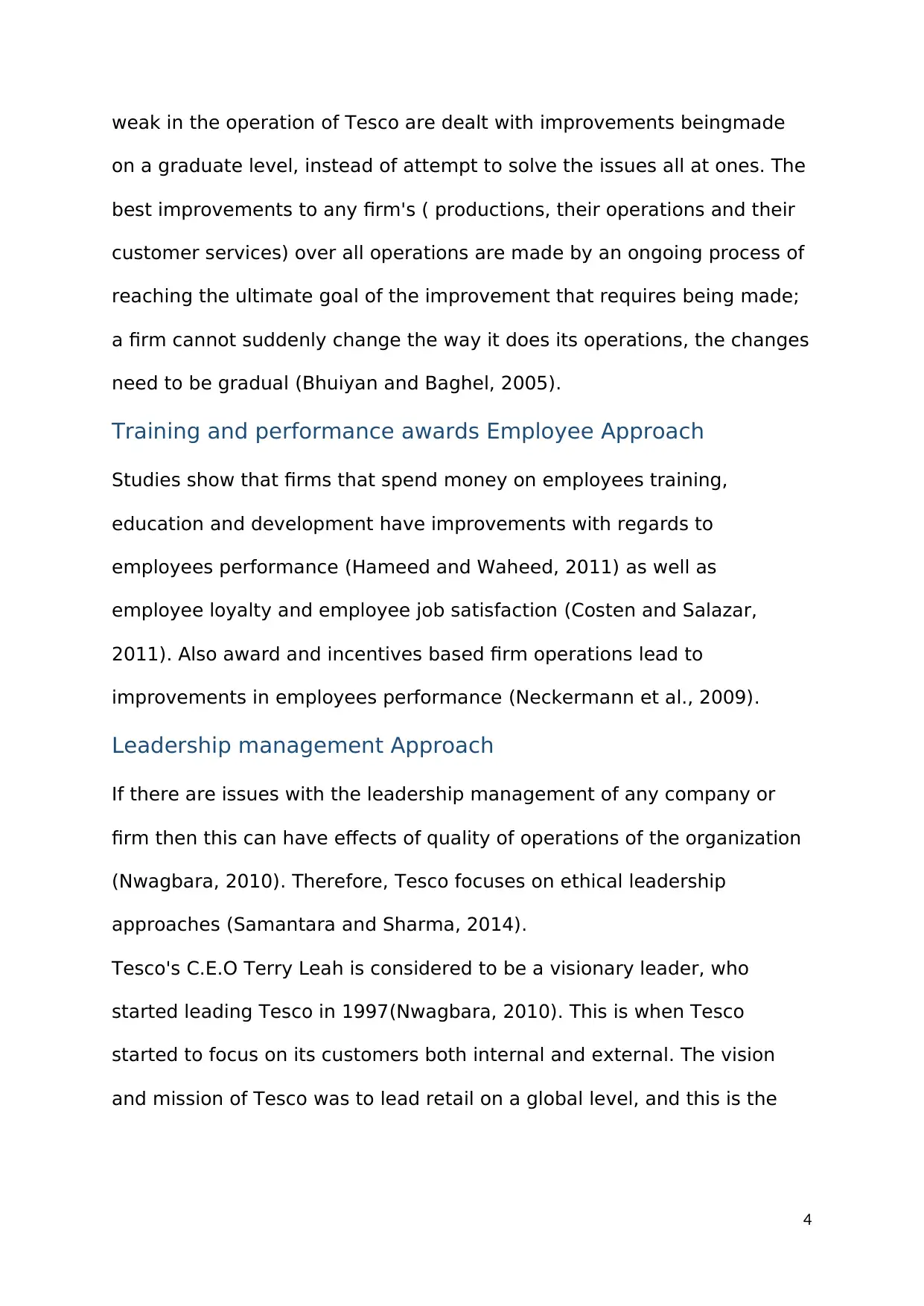
weak in the operation of Tesco are dealt with improvements beingmade
on a graduate level, instead of attempt to solve the issues all at ones. The
best improvements to any firm's ( productions, their operations and their
customer services) over all operations are made by an ongoing process of
reaching the ultimate goal of the improvement that requires being made;
a firm cannot suddenly change the way it does its operations, the changes
need to be gradual (Bhuiyan and Baghel, 2005).
Training and performance awards Employee Approach
Studies show that firms that spend money on employees training,
education and development have improvements with regards to
employees performance (Hameed and Waheed, 2011) as well as
employee loyalty and employee job satisfaction (Costen and Salazar,
2011). Also award and incentives based firm operations lead to
improvements in employees performance (Neckermann et al., 2009).
Leadership management Approach
If there are issues with the leadership management of any company or
firm then this can have effects of quality of operations of the organization
(Nwagbara, 2010). Therefore, Tesco focuses on ethical leadership
approaches (Samantara and Sharma, 2014).
Tesco's C.E.O Terry Leah is considered to be a visionary leader, who
started leading Tesco in 1997(Nwagbara, 2010). This is when Tesco
started to focus on its customers both internal and external. The vision
and mission of Tesco was to lead retail on a global level, and this is the
4
on a graduate level, instead of attempt to solve the issues all at ones. The
best improvements to any firm's ( productions, their operations and their
customer services) over all operations are made by an ongoing process of
reaching the ultimate goal of the improvement that requires being made;
a firm cannot suddenly change the way it does its operations, the changes
need to be gradual (Bhuiyan and Baghel, 2005).
Training and performance awards Employee Approach
Studies show that firms that spend money on employees training,
education and development have improvements with regards to
employees performance (Hameed and Waheed, 2011) as well as
employee loyalty and employee job satisfaction (Costen and Salazar,
2011). Also award and incentives based firm operations lead to
improvements in employees performance (Neckermann et al., 2009).
Leadership management Approach
If there are issues with the leadership management of any company or
firm then this can have effects of quality of operations of the organization
(Nwagbara, 2010). Therefore, Tesco focuses on ethical leadership
approaches (Samantara and Sharma, 2014).
Tesco's C.E.O Terry Leah is considered to be a visionary leader, who
started leading Tesco in 1997(Nwagbara, 2010). This is when Tesco
started to focus on its customers both internal and external. The vision
and mission of Tesco was to lead retail on a global level, and this is the
4
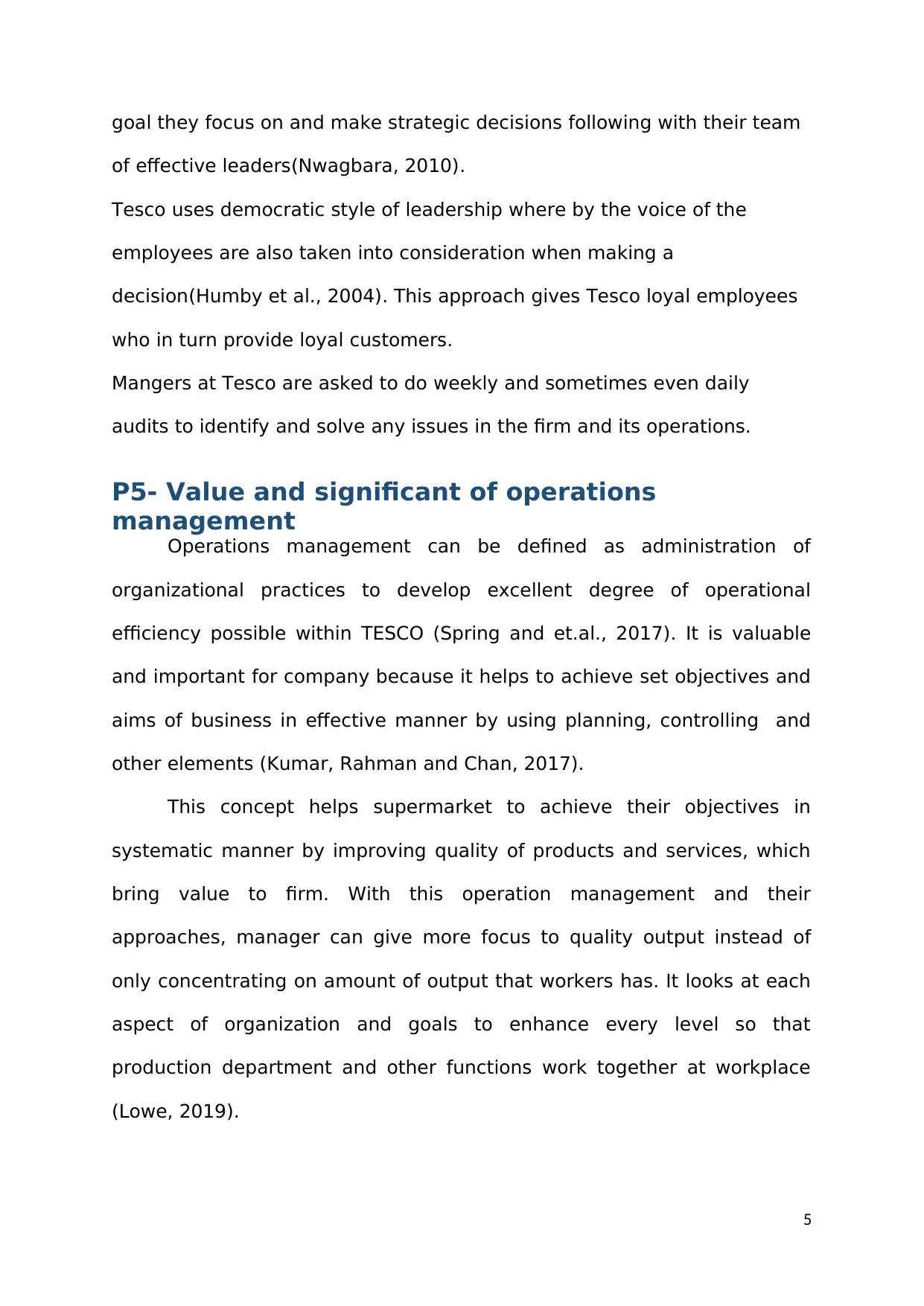
goal they focus on and make strategic decisions following with their team
of effective leaders(Nwagbara, 2010).
Tesco uses democratic style of leadership where by the voice of the
employees are also taken into consideration when making a
decision(Humby et al., 2004). This approach gives Tesco loyal employees
who in turn provide loyal customers.
Mangers at Tesco are asked to do weekly and sometimes even daily
audits to identify and solve any issues in the firm and its operations.
P5- Value and significant of operations
management
Operations management can be defined as administration of
organizational practices to develop excellent degree of operational
efficiency possible within TESCO (Spring and et.al., 2017). It is valuable
and important for company because it helps to achieve set objectives and
aims of business in effective manner by using planning, controlling and
other elements (Kumar, Rahman and Chan, 2017).
This concept helps supermarket to achieve their objectives in
systematic manner by improving quality of products and services, which
bring value to firm. With this operation management and their
approaches, manager can give more focus to quality output instead of
only concentrating on amount of output that workers has. It looks at each
aspect of organization and goals to enhance every level so that
production department and other functions work together at workplace
(Lowe, 2019).
5
of effective leaders(Nwagbara, 2010).
Tesco uses democratic style of leadership where by the voice of the
employees are also taken into consideration when making a
decision(Humby et al., 2004). This approach gives Tesco loyal employees
who in turn provide loyal customers.
Mangers at Tesco are asked to do weekly and sometimes even daily
audits to identify and solve any issues in the firm and its operations.
P5- Value and significant of operations
management
Operations management can be defined as administration of
organizational practices to develop excellent degree of operational
efficiency possible within TESCO (Spring and et.al., 2017). It is valuable
and important for company because it helps to achieve set objectives and
aims of business in effective manner by using planning, controlling and
other elements (Kumar, Rahman and Chan, 2017).
This concept helps supermarket to achieve their objectives in
systematic manner by improving quality of products and services, which
bring value to firm. With this operation management and their
approaches, manager can give more focus to quality output instead of
only concentrating on amount of output that workers has. It looks at each
aspect of organization and goals to enhance every level so that
production department and other functions work together at workplace
(Lowe, 2019).
5
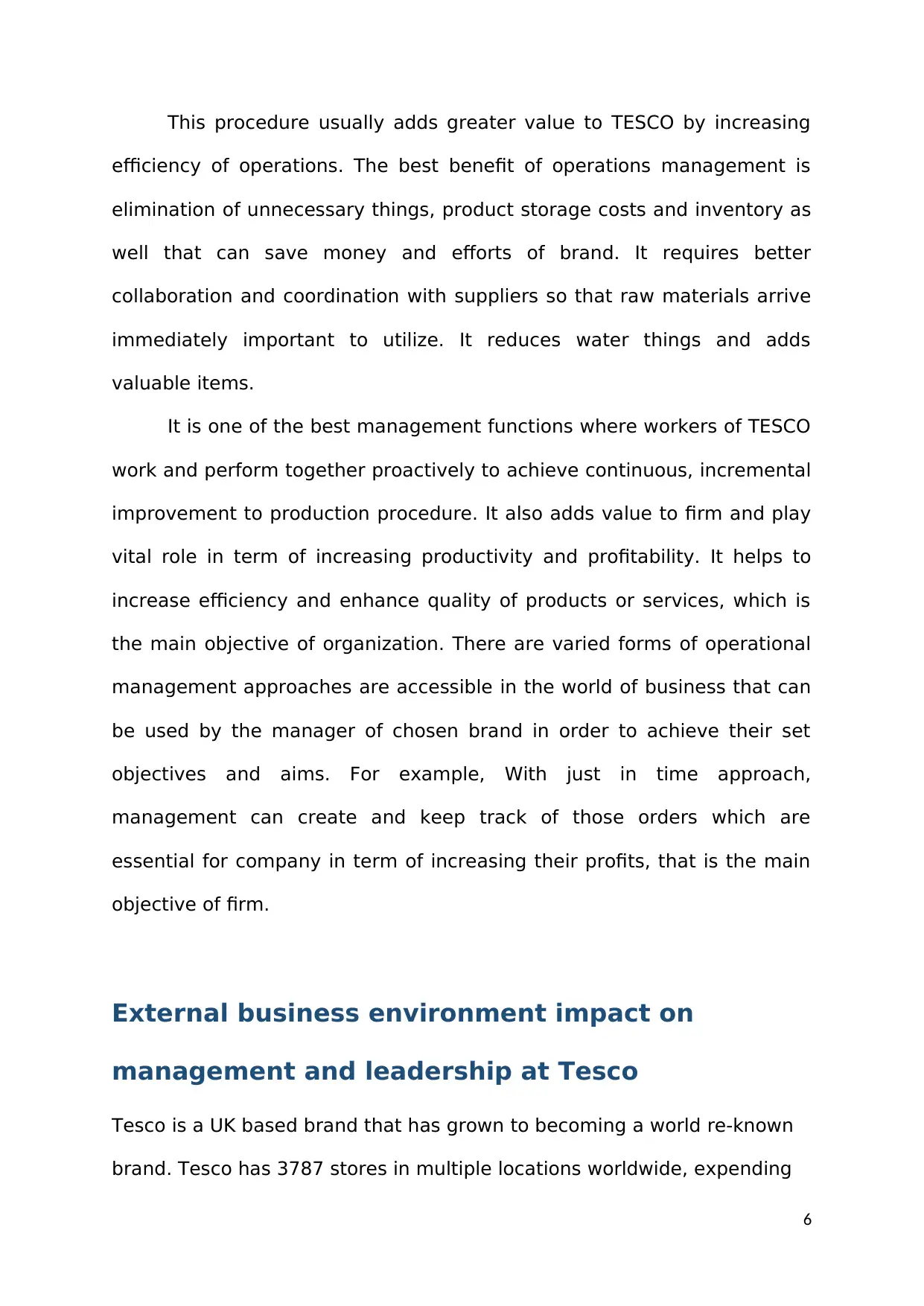
This procedure usually adds greater value to TESCO by increasing
efficiency of operations. The best benefit of operations management is
elimination of unnecessary things, product storage costs and inventory as
well that can save money and efforts of brand. It requires better
collaboration and coordination with suppliers so that raw materials arrive
immediately important to utilize. It reduces water things and adds
valuable items.
It is one of the best management functions where workers of TESCO
work and perform together proactively to achieve continuous, incremental
improvement to production procedure. It also adds value to firm and play
vital role in term of increasing productivity and profitability. It helps to
increase efficiency and enhance quality of products or services, which is
the main objective of organization. There are varied forms of operational
management approaches are accessible in the world of business that can
be used by the manager of chosen brand in order to achieve their set
objectives and aims. For example, With just in time approach,
management can create and keep track of those orders which are
essential for company in term of increasing their profits, that is the main
objective of firm.
External business environment impact on
management and leadership at Tesco
Tesco is a UK based brand that has grown to becoming a world re-known
brand. Tesco has 3787 stores in multiple locations worldwide, expending
6
efficiency of operations. The best benefit of operations management is
elimination of unnecessary things, product storage costs and inventory as
well that can save money and efforts of brand. It requires better
collaboration and coordination with suppliers so that raw materials arrive
immediately important to utilize. It reduces water things and adds
valuable items.
It is one of the best management functions where workers of TESCO
work and perform together proactively to achieve continuous, incremental
improvement to production procedure. It also adds value to firm and play
vital role in term of increasing productivity and profitability. It helps to
increase efficiency and enhance quality of products or services, which is
the main objective of organization. There are varied forms of operational
management approaches are accessible in the world of business that can
be used by the manager of chosen brand in order to achieve their set
objectives and aims. For example, With just in time approach,
management can create and keep track of those orders which are
essential for company in term of increasing their profits, that is the main
objective of firm.
External business environment impact on
management and leadership at Tesco
Tesco is a UK based brand that has grown to becoming a world re-known
brand. Tesco has 3787 stores in multiple locations worldwide, expending
6
Paraphrase This Document
Need a fresh take? Get an instant paraphrase of this document with our AI Paraphraser
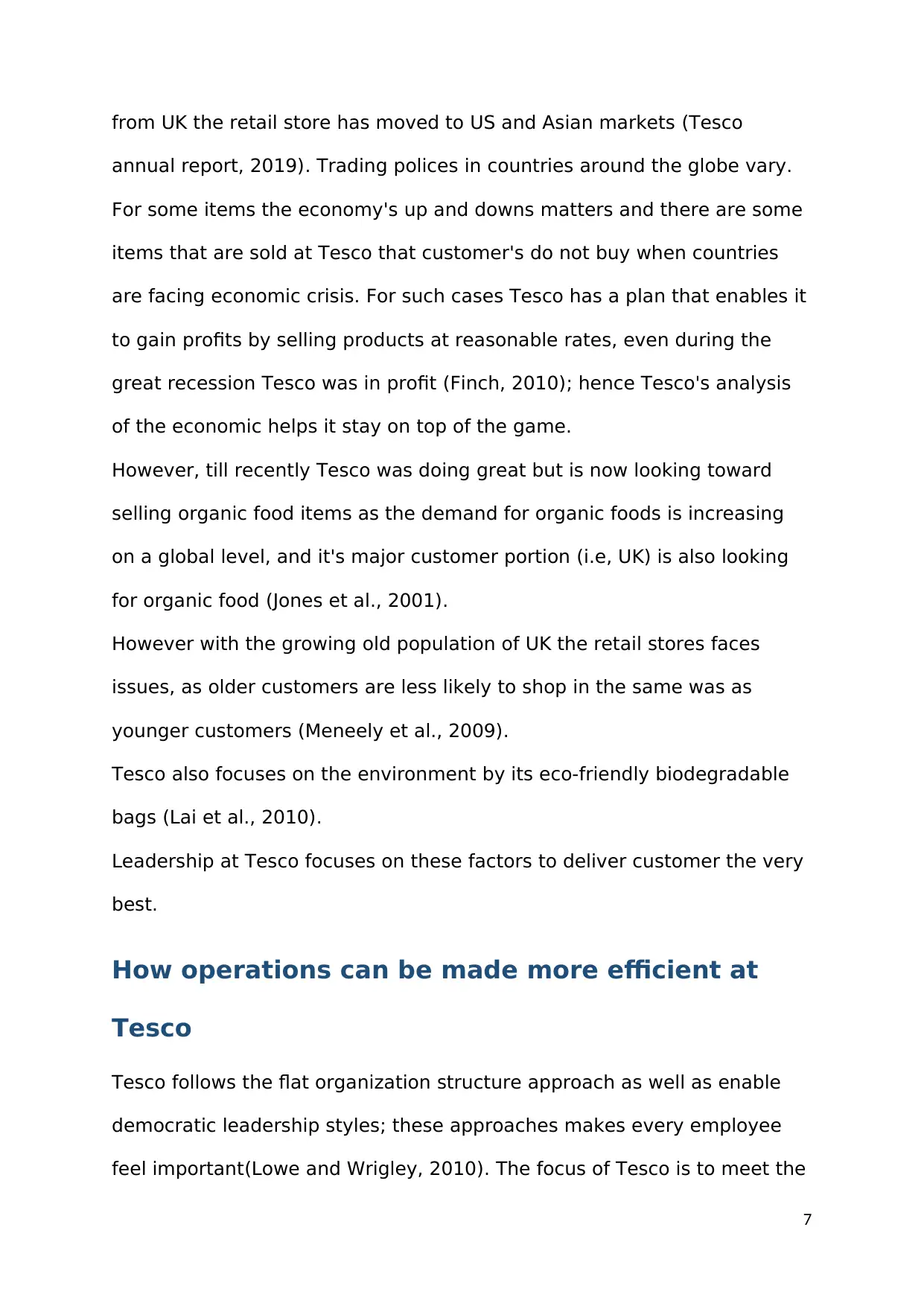
from UK the retail store has moved to US and Asian markets (Tesco
annual report, 2019). Trading polices in countries around the globe vary.
For some items the economy's up and downs matters and there are some
items that are sold at Tesco that customer's do not buy when countries
are facing economic crisis. For such cases Tesco has a plan that enables it
to gain profits by selling products at reasonable rates, even during the
great recession Tesco was in profit (Finch, 2010); hence Tesco's analysis
of the economic helps it stay on top of the game.
However, till recently Tesco was doing great but is now looking toward
selling organic food items as the demand for organic foods is increasing
on a global level, and it's major customer portion (i.e, UK) is also looking
for organic food (Jones et al., 2001).
However with the growing old population of UK the retail stores faces
issues, as older customers are less likely to shop in the same was as
younger customers (Meneely et al., 2009).
Tesco also focuses on the environment by its eco-friendly biodegradable
bags (Lai et al., 2010).
Leadership at Tesco focuses on these factors to deliver customer the very
best.
How operations can be made more efficient at
Tesco
Tesco follows the flat organization structure approach as well as enable
democratic leadership styles; these approaches makes every employee
feel important(Lowe and Wrigley, 2010). The focus of Tesco is to meet the
7
annual report, 2019). Trading polices in countries around the globe vary.
For some items the economy's up and downs matters and there are some
items that are sold at Tesco that customer's do not buy when countries
are facing economic crisis. For such cases Tesco has a plan that enables it
to gain profits by selling products at reasonable rates, even during the
great recession Tesco was in profit (Finch, 2010); hence Tesco's analysis
of the economic helps it stay on top of the game.
However, till recently Tesco was doing great but is now looking toward
selling organic food items as the demand for organic foods is increasing
on a global level, and it's major customer portion (i.e, UK) is also looking
for organic food (Jones et al., 2001).
However with the growing old population of UK the retail stores faces
issues, as older customers are less likely to shop in the same was as
younger customers (Meneely et al., 2009).
Tesco also focuses on the environment by its eco-friendly biodegradable
bags (Lai et al., 2010).
Leadership at Tesco focuses on these factors to deliver customer the very
best.
How operations can be made more efficient at
Tesco
Tesco follows the flat organization structure approach as well as enable
democratic leadership styles; these approaches makes every employee
feel important(Lowe and Wrigley, 2010). The focus of Tesco is to meet the
7
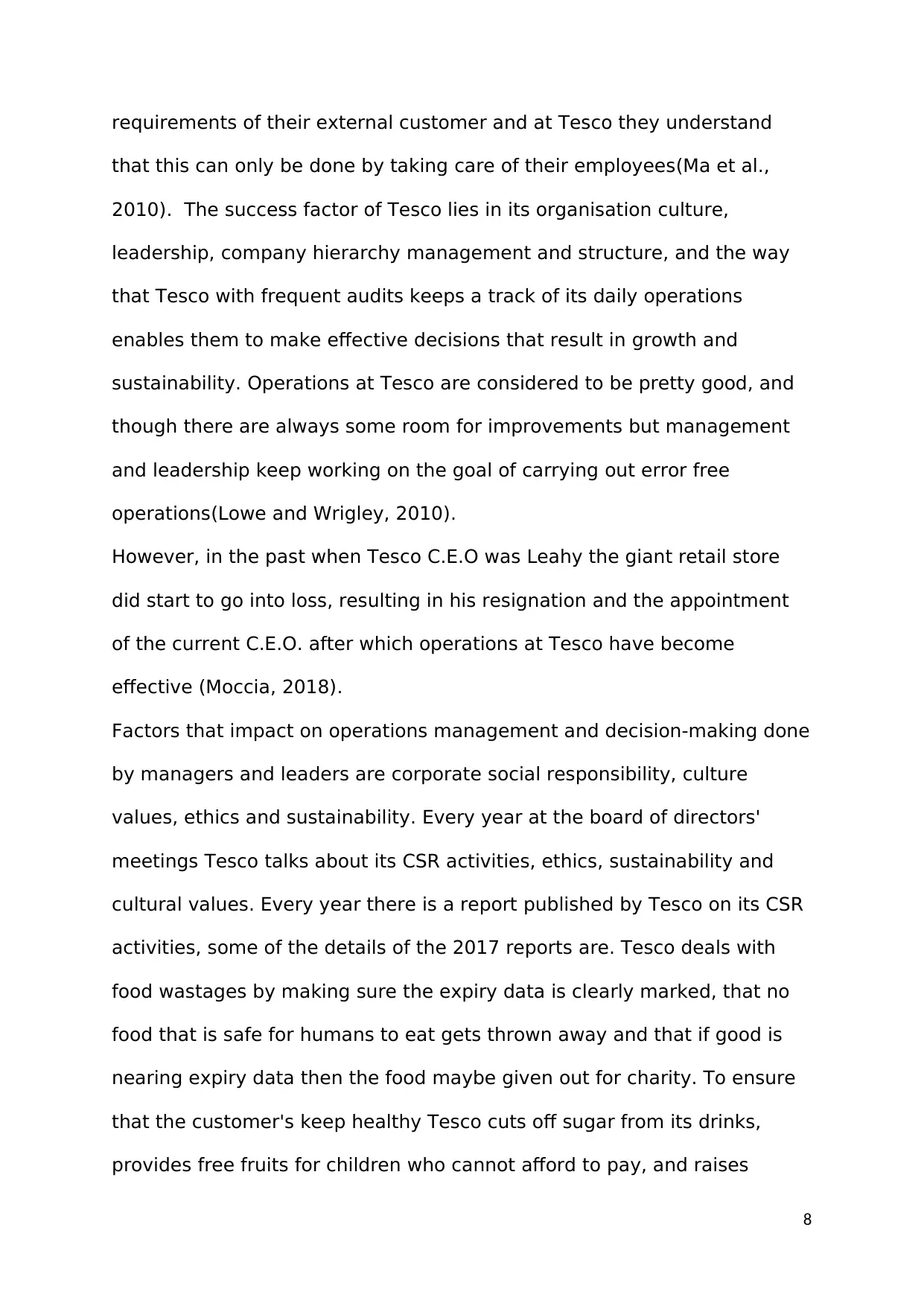
requirements of their external customer and at Tesco they understand
that this can only be done by taking care of their employees(Ma et al.,
2010). The success factor of Tesco lies in its organisation culture,
leadership, company hierarchy management and structure, and the way
that Tesco with frequent audits keeps a track of its daily operations
enables them to make effective decisions that result in growth and
sustainability. Operations at Tesco are considered to be pretty good, and
though there are always some room for improvements but management
and leadership keep working on the goal of carrying out error free
operations(Lowe and Wrigley, 2010).
However, in the past when Tesco C.E.O was Leahy the giant retail store
did start to go into loss, resulting in his resignation and the appointment
of the current C.E.O. after which operations at Tesco have become
effective (Moccia, 2018).
Factors that impact on operations management and decision-making done
by managers and leaders are corporate social responsibility, culture
values, ethics and sustainability. Every year at the board of directors'
meetings Tesco talks about its CSR activities, ethics, sustainability and
cultural values. Every year there is a report published by Tesco on its CSR
activities, some of the details of the 2017 reports are. Tesco deals with
food wastages by making sure the expiry data is clearly marked, that no
food that is safe for humans to eat gets thrown away and that if good is
nearing expiry data then the food maybe given out for charity. To ensure
that the customer's keep healthy Tesco cuts off sugar from its drinks,
provides free fruits for children who cannot afford to pay, and raises
8
that this can only be done by taking care of their employees(Ma et al.,
2010). The success factor of Tesco lies in its organisation culture,
leadership, company hierarchy management and structure, and the way
that Tesco with frequent audits keeps a track of its daily operations
enables them to make effective decisions that result in growth and
sustainability. Operations at Tesco are considered to be pretty good, and
though there are always some room for improvements but management
and leadership keep working on the goal of carrying out error free
operations(Lowe and Wrigley, 2010).
However, in the past when Tesco C.E.O was Leahy the giant retail store
did start to go into loss, resulting in his resignation and the appointment
of the current C.E.O. after which operations at Tesco have become
effective (Moccia, 2018).
Factors that impact on operations management and decision-making done
by managers and leaders are corporate social responsibility, culture
values, ethics and sustainability. Every year at the board of directors'
meetings Tesco talks about its CSR activities, ethics, sustainability and
cultural values. Every year there is a report published by Tesco on its CSR
activities, some of the details of the 2017 reports are. Tesco deals with
food wastages by making sure the expiry data is clearly marked, that no
food that is safe for humans to eat gets thrown away and that if good is
nearing expiry data then the food maybe given out for charity. To ensure
that the customer's keep healthy Tesco cuts off sugar from its drinks,
provides free fruits for children who cannot afford to pay, and raises
8
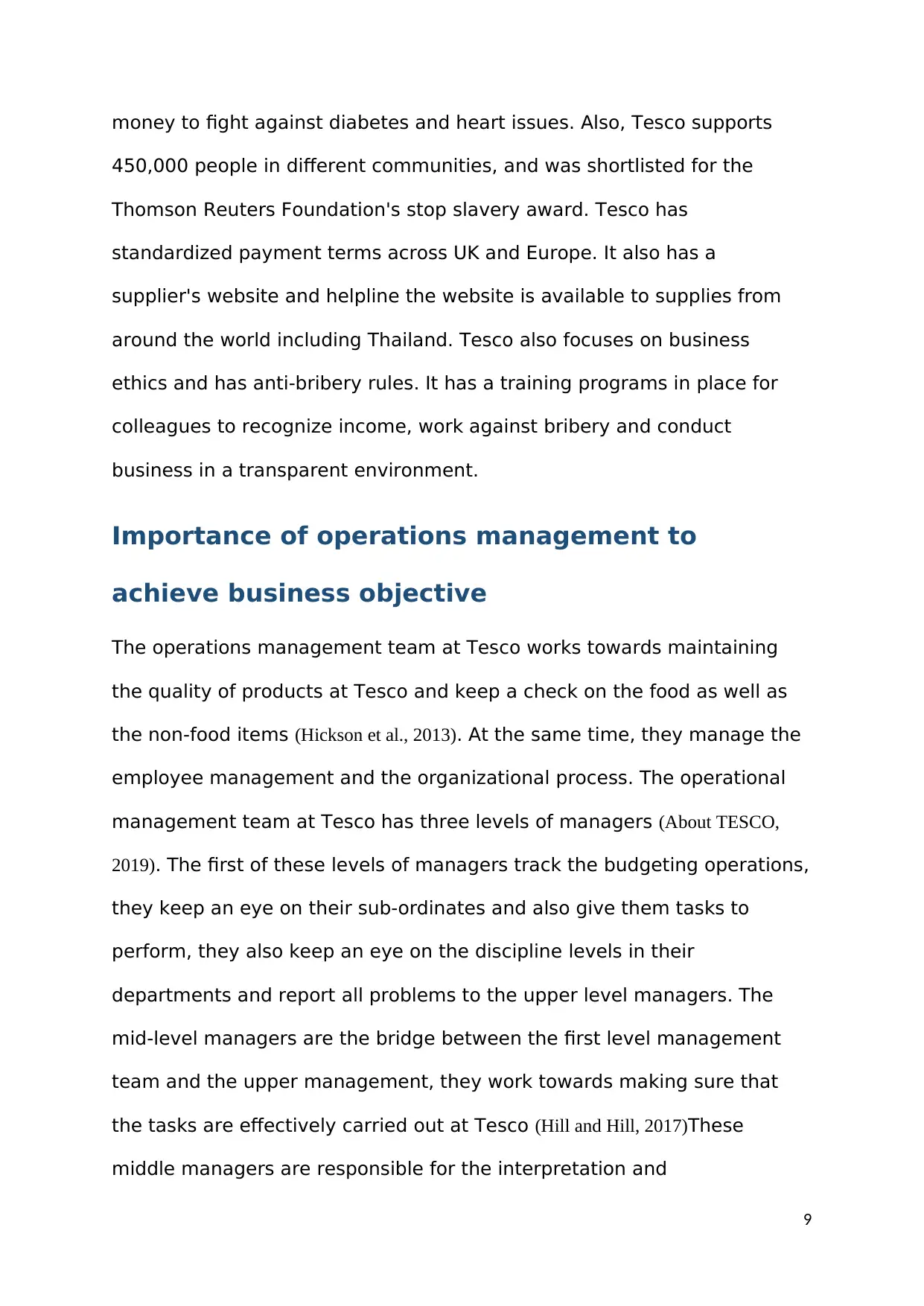
money to fight against diabetes and heart issues. Also, Tesco supports
450,000 people in different communities, and was shortlisted for the
Thomson Reuters Foundation's stop slavery award. Tesco has
standardized payment terms across UK and Europe. It also has a
supplier's website and helpline the website is available to supplies from
around the world including Thailand. Tesco also focuses on business
ethics and has anti-bribery rules. It has a training programs in place for
colleagues to recognize income, work against bribery and conduct
business in a transparent environment.
Importance of operations management to
achieve business objective
The operations management team at Tesco works towards maintaining
the quality of products at Tesco and keep a check on the food as well as
the non-food items (Hickson et al., 2013). At the same time, they manage the
employee management and the organizational process. The operational
management team at Tesco has three levels of managers (About TESCO,
2019). The first of these levels of managers track the budgeting operations,
they keep an eye on their sub-ordinates and also give them tasks to
perform, they also keep an eye on the discipline levels in their
departments and report all problems to the upper level managers. The
mid-level managers are the bridge between the first level management
team and the upper management, they work towards making sure that
the tasks are effectively carried out at Tesco (Hill and Hill, 2017)These
middle managers are responsible for the interpretation and
9
450,000 people in different communities, and was shortlisted for the
Thomson Reuters Foundation's stop slavery award. Tesco has
standardized payment terms across UK and Europe. It also has a
supplier's website and helpline the website is available to supplies from
around the world including Thailand. Tesco also focuses on business
ethics and has anti-bribery rules. It has a training programs in place for
colleagues to recognize income, work against bribery and conduct
business in a transparent environment.
Importance of operations management to
achieve business objective
The operations management team at Tesco works towards maintaining
the quality of products at Tesco and keep a check on the food as well as
the non-food items (Hickson et al., 2013). At the same time, they manage the
employee management and the organizational process. The operational
management team at Tesco has three levels of managers (About TESCO,
2019). The first of these levels of managers track the budgeting operations,
they keep an eye on their sub-ordinates and also give them tasks to
perform, they also keep an eye on the discipline levels in their
departments and report all problems to the upper level managers. The
mid-level managers are the bridge between the first level management
team and the upper management, they work towards making sure that
the tasks are effectively carried out at Tesco (Hill and Hill, 2017)These
middle managers are responsible for the interpretation and
9
Secure Best Marks with AI Grader
Need help grading? Try our AI Grader for instant feedback on your assignments.
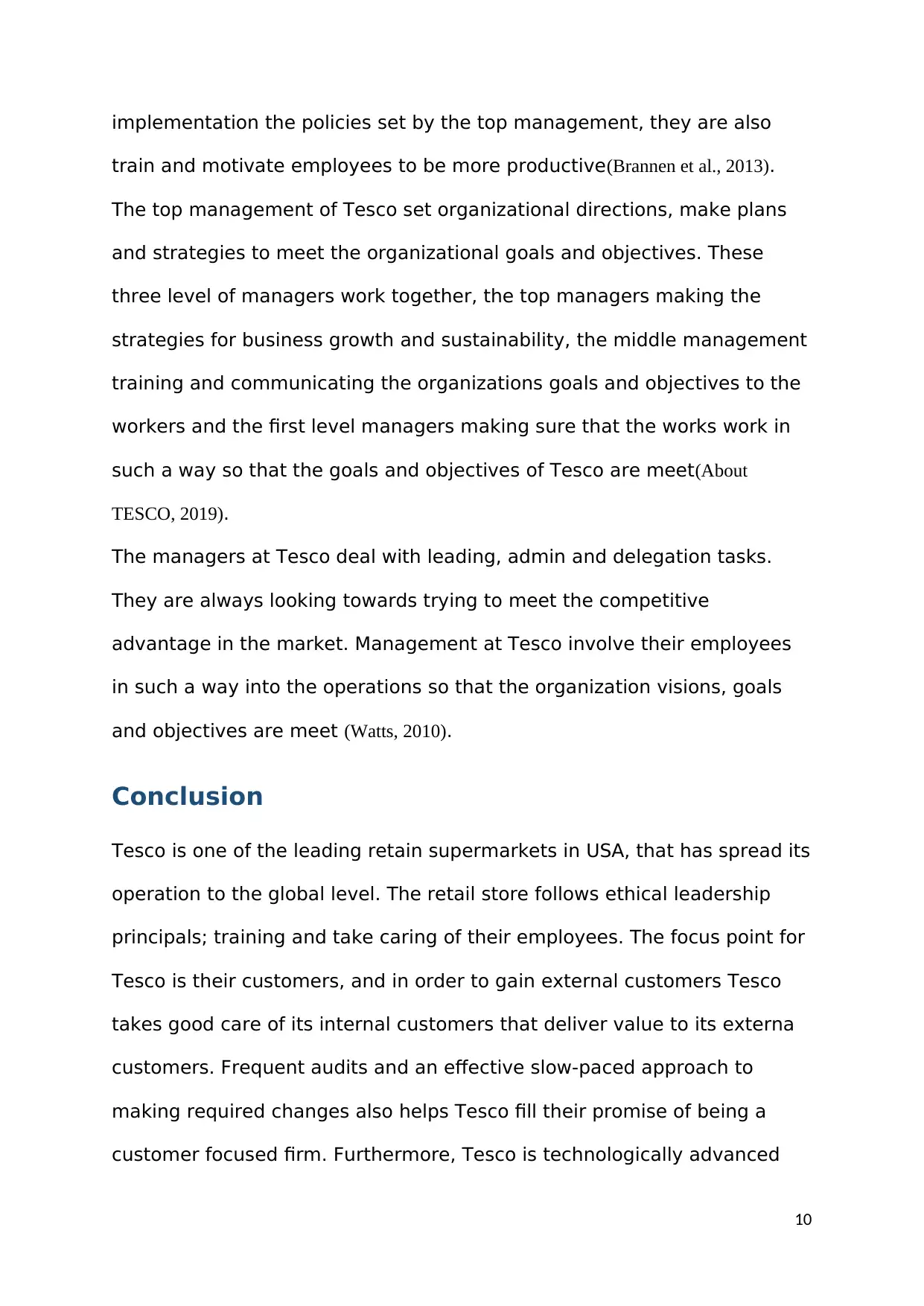
implementation the policies set by the top management, they are also
train and motivate employees to be more productive(Brannen et al., 2013).
The top management of Tesco set organizational directions, make plans
and strategies to meet the organizational goals and objectives. These
three level of managers work together, the top managers making the
strategies for business growth and sustainability, the middle management
training and communicating the organizations goals and objectives to the
workers and the first level managers making sure that the works work in
such a way so that the goals and objectives of Tesco are meet(About
TESCO, 2019).
The managers at Tesco deal with leading, admin and delegation tasks.
They are always looking towards trying to meet the competitive
advantage in the market. Management at Tesco involve their employees
in such a way into the operations so that the organization visions, goals
and objectives are meet (Watts, 2010).
Conclusion
Tesco is one of the leading retain supermarkets in USA, that has spread its
operation to the global level. The retail store follows ethical leadership
principals; training and take caring of their employees. The focus point for
Tesco is their customers, and in order to gain external customers Tesco
takes good care of its internal customers that deliver value to its externa
customers. Frequent audits and an effective slow-paced approach to
making required changes also helps Tesco fill their promise of being a
customer focused firm. Furthermore, Tesco is technologically advanced
10
train and motivate employees to be more productive(Brannen et al., 2013).
The top management of Tesco set organizational directions, make plans
and strategies to meet the organizational goals and objectives. These
three level of managers work together, the top managers making the
strategies for business growth and sustainability, the middle management
training and communicating the organizations goals and objectives to the
workers and the first level managers making sure that the works work in
such a way so that the goals and objectives of Tesco are meet(About
TESCO, 2019).
The managers at Tesco deal with leading, admin and delegation tasks.
They are always looking towards trying to meet the competitive
advantage in the market. Management at Tesco involve their employees
in such a way into the operations so that the organization visions, goals
and objectives are meet (Watts, 2010).
Conclusion
Tesco is one of the leading retain supermarkets in USA, that has spread its
operation to the global level. The retail store follows ethical leadership
principals; training and take caring of their employees. The focus point for
Tesco is their customers, and in order to gain external customers Tesco
takes good care of its internal customers that deliver value to its externa
customers. Frequent audits and an effective slow-paced approach to
making required changes also helps Tesco fill their promise of being a
customer focused firm. Furthermore, Tesco is technologically advanced
10
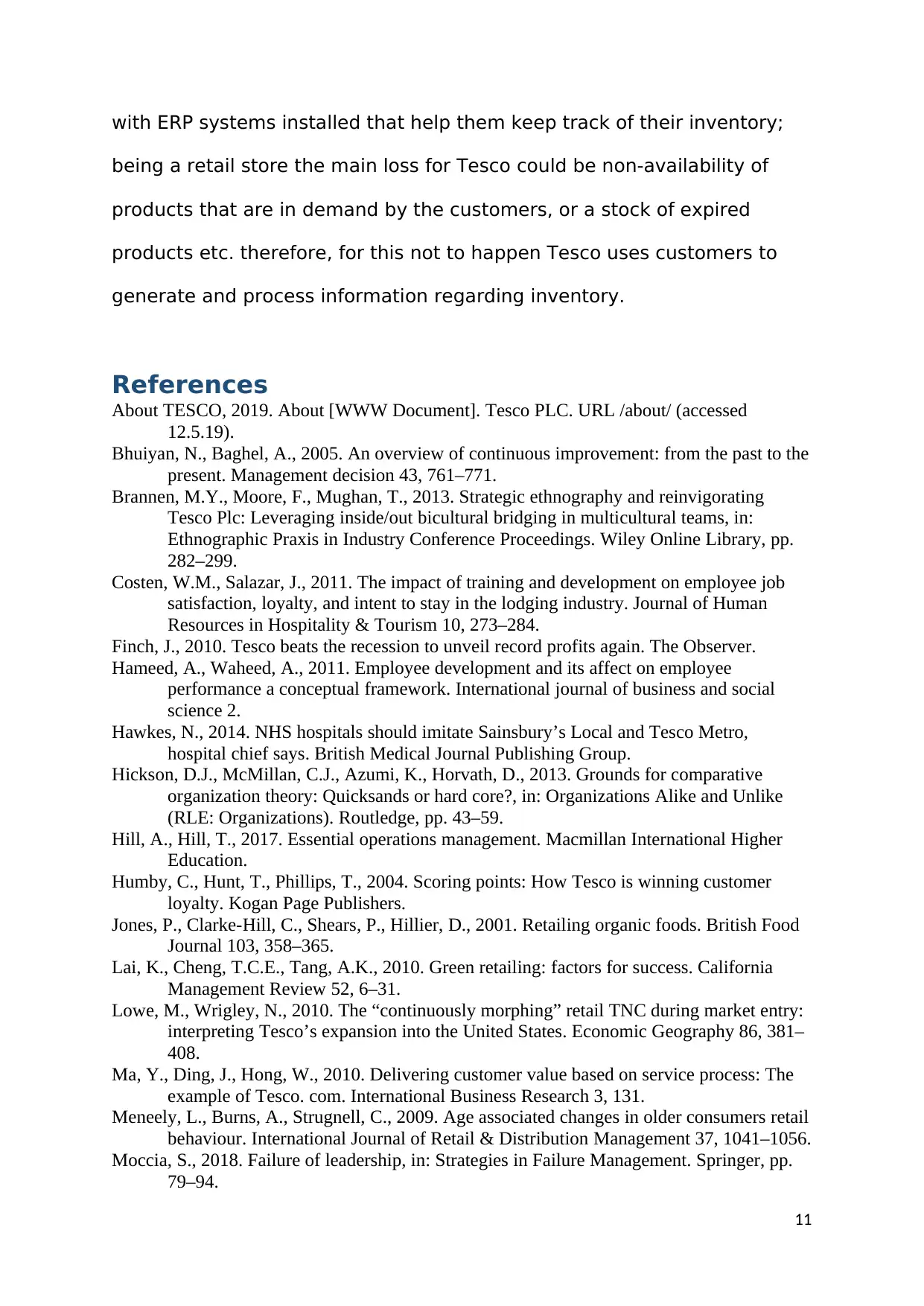
with ERP systems installed that help them keep track of their inventory;
being a retail store the main loss for Tesco could be non-availability of
products that are in demand by the customers, or a stock of expired
products etc. therefore, for this not to happen Tesco uses customers to
generate and process information regarding inventory.
References
About TESCO, 2019. About [WWW Document]. Tesco PLC. URL /about/ (accessed
12.5.19).
Bhuiyan, N., Baghel, A., 2005. An overview of continuous improvement: from the past to the
present. Management decision 43, 761–771.
Brannen, M.Y., Moore, F., Mughan, T., 2013. Strategic ethnography and reinvigorating
Tesco Plc: Leveraging inside/out bicultural bridging in multicultural teams, in:
Ethnographic Praxis in Industry Conference Proceedings. Wiley Online Library, pp.
282–299.
Costen, W.M., Salazar, J., 2011. The impact of training and development on employee job
satisfaction, loyalty, and intent to stay in the lodging industry. Journal of Human
Resources in Hospitality & Tourism 10, 273–284.
Finch, J., 2010. Tesco beats the recession to unveil record profits again. The Observer.
Hameed, A., Waheed, A., 2011. Employee development and its affect on employee
performance a conceptual framework. International journal of business and social
science 2.
Hawkes, N., 2014. NHS hospitals should imitate Sainsbury’s Local and Tesco Metro,
hospital chief says. British Medical Journal Publishing Group.
Hickson, D.J., McMillan, C.J., Azumi, K., Horvath, D., 2013. Grounds for comparative
organization theory: Quicksands or hard core?, in: Organizations Alike and Unlike
(RLE: Organizations). Routledge, pp. 43–59.
Hill, A., Hill, T., 2017. Essential operations management. Macmillan International Higher
Education.
Humby, C., Hunt, T., Phillips, T., 2004. Scoring points: How Tesco is winning customer
loyalty. Kogan Page Publishers.
Jones, P., Clarke-Hill, C., Shears, P., Hillier, D., 2001. Retailing organic foods. British Food
Journal 103, 358–365.
Lai, K., Cheng, T.C.E., Tang, A.K., 2010. Green retailing: factors for success. California
Management Review 52, 6–31.
Lowe, M., Wrigley, N., 2010. The “continuously morphing” retail TNC during market entry:
interpreting Tesco’s expansion into the United States. Economic Geography 86, 381–
408.
Ma, Y., Ding, J., Hong, W., 2010. Delivering customer value based on service process: The
example of Tesco. com. International Business Research 3, 131.
Meneely, L., Burns, A., Strugnell, C., 2009. Age associated changes in older consumers retail
behaviour. International Journal of Retail & Distribution Management 37, 1041–1056.
Moccia, S., 2018. Failure of leadership, in: Strategies in Failure Management. Springer, pp.
79–94.
11
being a retail store the main loss for Tesco could be non-availability of
products that are in demand by the customers, or a stock of expired
products etc. therefore, for this not to happen Tesco uses customers to
generate and process information regarding inventory.
References
About TESCO, 2019. About [WWW Document]. Tesco PLC. URL /about/ (accessed
12.5.19).
Bhuiyan, N., Baghel, A., 2005. An overview of continuous improvement: from the past to the
present. Management decision 43, 761–771.
Brannen, M.Y., Moore, F., Mughan, T., 2013. Strategic ethnography and reinvigorating
Tesco Plc: Leveraging inside/out bicultural bridging in multicultural teams, in:
Ethnographic Praxis in Industry Conference Proceedings. Wiley Online Library, pp.
282–299.
Costen, W.M., Salazar, J., 2011. The impact of training and development on employee job
satisfaction, loyalty, and intent to stay in the lodging industry. Journal of Human
Resources in Hospitality & Tourism 10, 273–284.
Finch, J., 2010. Tesco beats the recession to unveil record profits again. The Observer.
Hameed, A., Waheed, A., 2011. Employee development and its affect on employee
performance a conceptual framework. International journal of business and social
science 2.
Hawkes, N., 2014. NHS hospitals should imitate Sainsbury’s Local and Tesco Metro,
hospital chief says. British Medical Journal Publishing Group.
Hickson, D.J., McMillan, C.J., Azumi, K., Horvath, D., 2013. Grounds for comparative
organization theory: Quicksands or hard core?, in: Organizations Alike and Unlike
(RLE: Organizations). Routledge, pp. 43–59.
Hill, A., Hill, T., 2017. Essential operations management. Macmillan International Higher
Education.
Humby, C., Hunt, T., Phillips, T., 2004. Scoring points: How Tesco is winning customer
loyalty. Kogan Page Publishers.
Jones, P., Clarke-Hill, C., Shears, P., Hillier, D., 2001. Retailing organic foods. British Food
Journal 103, 358–365.
Lai, K., Cheng, T.C.E., Tang, A.K., 2010. Green retailing: factors for success. California
Management Review 52, 6–31.
Lowe, M., Wrigley, N., 2010. The “continuously morphing” retail TNC during market entry:
interpreting Tesco’s expansion into the United States. Economic Geography 86, 381–
408.
Ma, Y., Ding, J., Hong, W., 2010. Delivering customer value based on service process: The
example of Tesco. com. International Business Research 3, 131.
Meneely, L., Burns, A., Strugnell, C., 2009. Age associated changes in older consumers retail
behaviour. International Journal of Retail & Distribution Management 37, 1041–1056.
Moccia, S., 2018. Failure of leadership, in: Strategies in Failure Management. Springer, pp.
79–94.
11
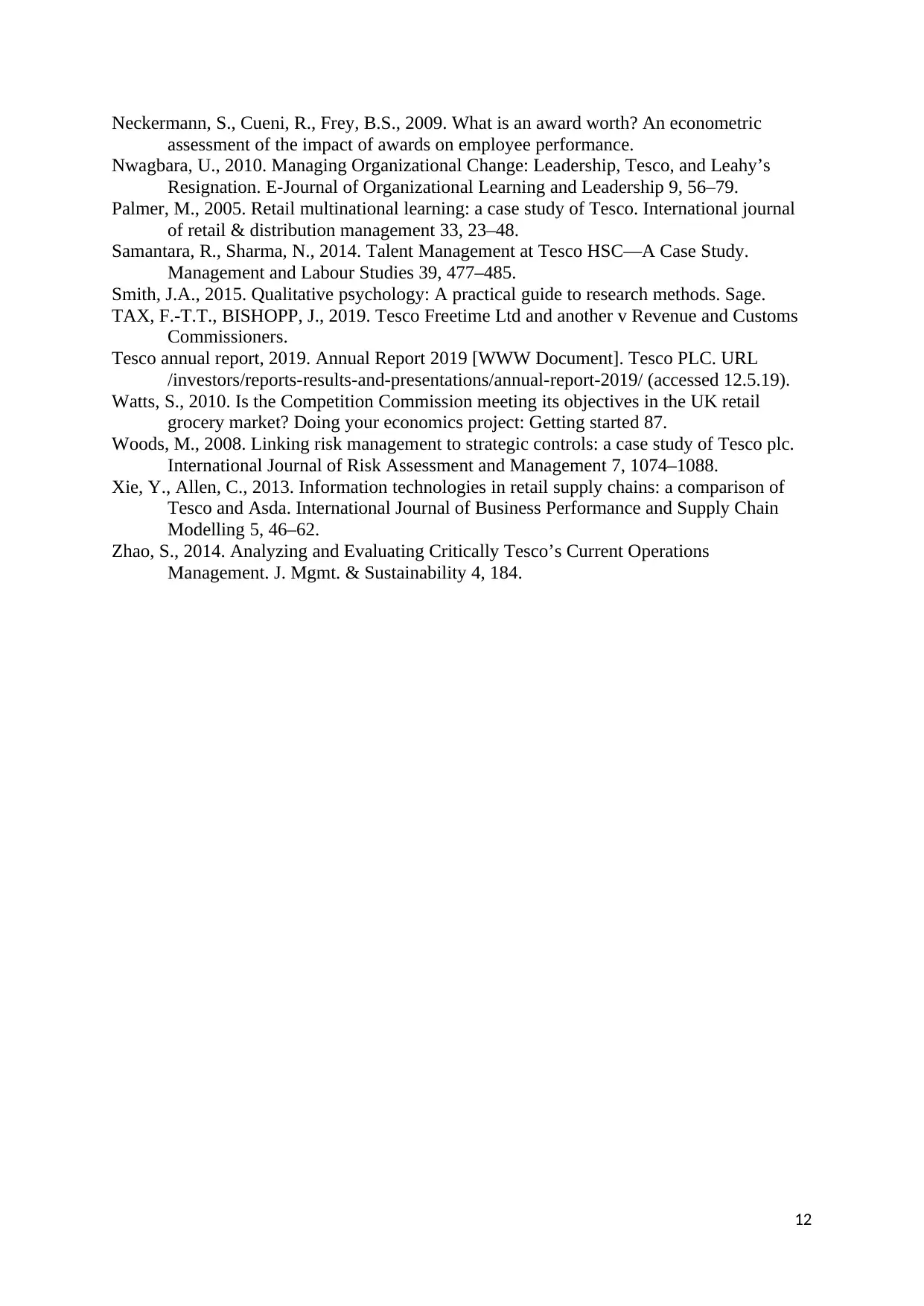
Neckermann, S., Cueni, R., Frey, B.S., 2009. What is an award worth? An econometric
assessment of the impact of awards on employee performance.
Nwagbara, U., 2010. Managing Organizational Change: Leadership, Tesco, and Leahy’s
Resignation. E-Journal of Organizational Learning and Leadership 9, 56–79.
Palmer, M., 2005. Retail multinational learning: a case study of Tesco. International journal
of retail & distribution management 33, 23–48.
Samantara, R., Sharma, N., 2014. Talent Management at Tesco HSC—A Case Study.
Management and Labour Studies 39, 477–485.
Smith, J.A., 2015. Qualitative psychology: A practical guide to research methods. Sage.
TAX, F.-T.T., BISHOPP, J., 2019. Tesco Freetime Ltd and another v Revenue and Customs
Commissioners.
Tesco annual report, 2019. Annual Report 2019 [WWW Document]. Tesco PLC. URL
/investors/reports-results-and-presentations/annual-report-2019/ (accessed 12.5.19).
Watts, S., 2010. Is the Competition Commission meeting its objectives in the UK retail
grocery market? Doing your economics project: Getting started 87.
Woods, M., 2008. Linking risk management to strategic controls: a case study of Tesco plc.
International Journal of Risk Assessment and Management 7, 1074–1088.
Xie, Y., Allen, C., 2013. Information technologies in retail supply chains: a comparison of
Tesco and Asda. International Journal of Business Performance and Supply Chain
Modelling 5, 46–62.
Zhao, S., 2014. Analyzing and Evaluating Critically Tesco’s Current Operations
Management. J. Mgmt. & Sustainability 4, 184.
12
assessment of the impact of awards on employee performance.
Nwagbara, U., 2010. Managing Organizational Change: Leadership, Tesco, and Leahy’s
Resignation. E-Journal of Organizational Learning and Leadership 9, 56–79.
Palmer, M., 2005. Retail multinational learning: a case study of Tesco. International journal
of retail & distribution management 33, 23–48.
Samantara, R., Sharma, N., 2014. Talent Management at Tesco HSC—A Case Study.
Management and Labour Studies 39, 477–485.
Smith, J.A., 2015. Qualitative psychology: A practical guide to research methods. Sage.
TAX, F.-T.T., BISHOPP, J., 2019. Tesco Freetime Ltd and another v Revenue and Customs
Commissioners.
Tesco annual report, 2019. Annual Report 2019 [WWW Document]. Tesco PLC. URL
/investors/reports-results-and-presentations/annual-report-2019/ (accessed 12.5.19).
Watts, S., 2010. Is the Competition Commission meeting its objectives in the UK retail
grocery market? Doing your economics project: Getting started 87.
Woods, M., 2008. Linking risk management to strategic controls: a case study of Tesco plc.
International Journal of Risk Assessment and Management 7, 1074–1088.
Xie, Y., Allen, C., 2013. Information technologies in retail supply chains: a comparison of
Tesco and Asda. International Journal of Business Performance and Supply Chain
Modelling 5, 46–62.
Zhao, S., 2014. Analyzing and Evaluating Critically Tesco’s Current Operations
Management. J. Mgmt. & Sustainability 4, 184.
12
1 out of 13
Related Documents
Your All-in-One AI-Powered Toolkit for Academic Success.
+13062052269
info@desklib.com
Available 24*7 on WhatsApp / Email
![[object Object]](/_next/static/media/star-bottom.7253800d.svg)
Unlock your academic potential
© 2024 | Zucol Services PVT LTD | All rights reserved.





